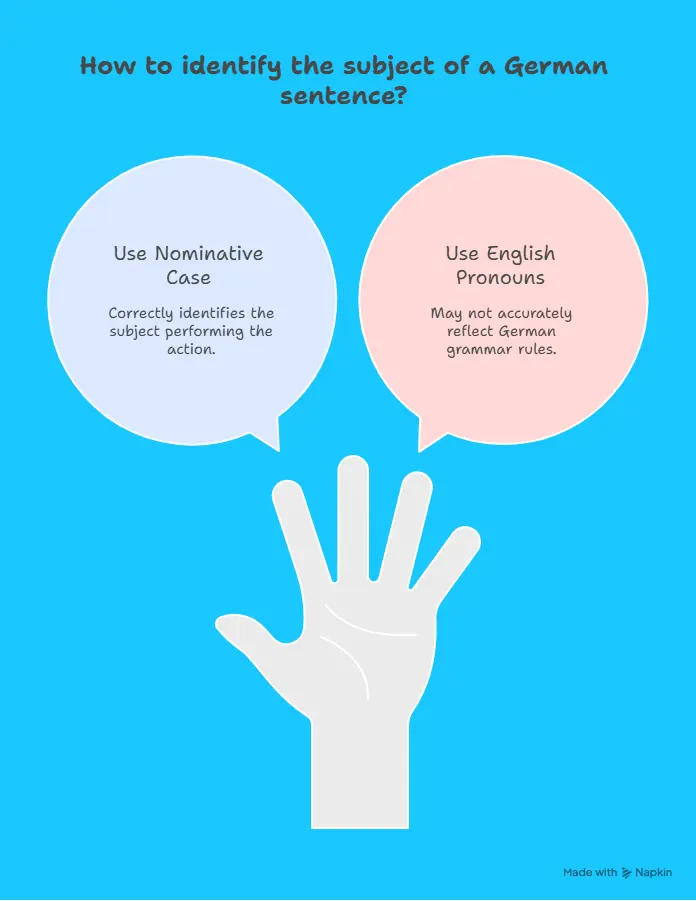Table of Contents
The idea that each word and pronoun serves a certain “job” in a German sentence is fundamental. It is done using cases. Since it reveals the subject of the sentence—the one doing the action—beginning with the nominative case is the simplest way to do so. To learn German sentence structure, this is the first step. The other cases, such as accusative and dative, will become second nature after you have mastered the nominative case.
Learn German language in your own language! Get free Demo Classes Here!
What is the Nominative Case in German?
When talking about the topic of a sentence in German, you should use the nominative case. This individual or group is to blame for what transpired. “The boy is playing” (German: “Der Junge spielt”) uses the nominative case since “Der Junge” is the subject of the statement. We also want to stress how important it is to teach English terms like “I,” “he,” “she,” and “they.” It still doesn’t modify the words depending on where they are in the line. But things are different in German. You may employ words that describe things (ich, du, er) and people (der, die, das) in many different ways. If you know who is conducting the action, you may use the right words by using the nominative case.
Nominative Case Articles & Pronouns
1: How do you say "Good Morning" in German?
Every name in German has a gender—masculine, feminine, or neuter—and the article (the word for “the” or “a”) changes depending on the gender. This is the case for nouns that are the subject of a sentence.
Definite and Indefinite Articles in the Nominative Case
| Gender | Definite Article (the) | Example | Indefinite Article (a/an) | Example |
|---|---|---|---|---|
| Masculine | der | der Mann (the man) | ein | ein Mann (a man) |
| Feminine | die | die Frau (the woman) | eine | eine Frau (a woman) |
| Neuter | das | das Kind (the child) | ein | ein Kind (a child) |
| Plural | die | die Kinder (the children) | — | — |
Personal Pronouns in the Nominative Case
| English | German | Example Sentence | Translation |
|---|---|---|---|
| I | ich | Ich bin müde. | I am tired. |
| You (singular, informal) | du | Du bist nett. | You are nice. |
| He | er | Er schläft. | He is sleeping. |
| She | sie | Sie lacht. | She is laughing. |
| It | es | Es regnet. | It is raining. |
| We | wir | Wir spielen. | We are playing. |
| You (plural, informal) | ihr | Ihr seid laut. | You (all) are loud. |
| They | sie | Sie tanzen. | They are dancing. |
| You (formal) | Sie | Sie sind freundlich. | You are friendly. |
Speak German Fluently – Your Future Starts Here!
Join our interactive German courses designed for all levels. Gain the skills to communicate effectively and open doors to new cultures and careers.
Start Learning GermanNominative Case Rules
1. The noun is always in front of the subject
The subject is the main thing or person that does the deed.
For example:
- Der Junge spielt Fußball—The boy plays football.
- Die Frau liest—That’s right, the woman is reading.
- Das Kind lacht – The child screamed. The kid is having fun.
The subject of each line is in the nominative case: Der Junge, Die Frau, Das Kind.
2. Use the Nominative Case After Linking Verbs
Rather of demonstrating an activity, many verbs tie the subject to a description or identification of the subject. These are referred to as linking verbs, and the most common ones in German use the following:
-
sein (to be)
-
werden (to become)
-
bleiben (to remain)
Examples:
-
Ich bin Lehrer. → I am a teacher.
-
Sie wird Ärztin. → She becomes a doctor.
-
Er bleibt ruhig. → He remains calm.
As a result of the fact that both sides of the phrase describe the same person or object, the nominative case is maintained across both parties.
Learn German language in your own language! Get free Demo Classes Here!
Examples of Nominative Case in Sentences
Allow me to demonstrate the usage of the nominative case by examining a few basic statements.
The nominative case is used for the subject in each of the examples, which refers to the person or thing that is doing or being something.
| German Sentence | English Translation | Explanation |
|---|---|---|
| Ich bin Lehrer. | I am a teacher. | Ich (I) is the subject. |
| Der Hund ist groß. | The dog is big. | Der Hund (the dog) is the subject. |
| Die Frau ist nett. | The woman is nice. | Die Frau (the woman) is in nominative. |
| Das Kind spielt. | The child is playing. | Das Kind (the child) does the action. |
| Wir sind Freunde. | We are friends. | Wir (we) is the subject. |
| Er bleibt ruhig. | He remains calm. | Er (he) stays in nominative. |
| Sie ist Ärztin. | She is a doctor. | Sie (she) is the subject of the sentence. |
Common Mistakes Learners Make
Despite the fact that the nominative case is the simplest to understand, novices often make errors that are quite minor but rather prevalent. Let’s take a look at two of them, as well as methods for fixing them.
1. Mixing the Nominative with the Accusative Case
Beginners in German sometimes use the accusative instead of the nominative. The nominative case designates the agent. An accusative case refers to the object of an action. Changing terms in English doesn’t demonstrate this. The German one. “Ich liebe ihn” uses the nominative case for “ich” and the accusative case for “him” since “I” perform the work and “he” gets the reward. “Ich liebe er” seems weird since “er” is nominative in German. Remember to use the nominative case for the doer and the accusative for the recipient.
Incorrect: Ich liebe er.
Correct: Ich liebe ihn. → I love him.
Here, ich (I) is the subject → nominative,
and ihn (him) is the object → accusative.
The subject is the only thing that uses the nominative case; the object does not.
2. Use the Nominative Case After Linking Verbs
Another common mistake made by students is a failure to properly use subject-verb order. Nouns and verbs in German take on different forms depending on the subject matter. The German words “ich,” “du,” “er,” and “wir” all include a final word. Instead of “Du bist müde,” the German expression “Ich bin müde” implies “You are tired.” The “ich bin müde” cannot be used since the -st ending can only be used with the person “du.” Check that the German verb tenses (I, you, he/she) and number (single or multiple) match the subject. Using the correct language and sounding more at ease will be easier with this.
Incorrect: Ich bist müde.
Correct: Ich bin müde. → I am tired.
Incorrect: Wir ist hier.
Correct: Wir sind hier. → We are here.
Make sure that the ending of the verb corresponds to the nominative subject at all times; this will ensure that your sentences are grammatically accurate and sound natural.
Speak German Fluently – Your Future Starts Here!
Join our interactive German courses designed for all levels. Gain the skills to communicate effectively and open doors to new cultures and careers.
Start Learning GermanNominative vs. Accusative (Quick Comparison)
It is common for German sentences to have both a subject and an object; this is where the nominative and accusative cases come into play.
The nominative indicates who or what is doing the action, while the accusative indicates who or what is being subjected to the action.
| Feature | Nominative Case | Accusative Case |
|---|---|---|
| Function | Subject (doer of the action) | Direct object (receiver of the action) |
| Question to Ask | Who? / What? | Whom? / What? |
| Example Sentence | Der Mann isst. → The man is eating. | Ich sehe den Mann. → I see the man. |
| What changes? (Masculine only) | der → der Mann | den → den Mann |
| Feminine/Neuter/Plural | stay the same | stay the same |
| Pronoun Example | Er schläft. (He sleeps.) | Ich sehe ihn. (I see him.) |
When to Use Each Case?
It is recommended that the nominative case be used when referring to the subject, who is the person who is carrying out the activity.
- Der Hund läuft. → The dog runs.
You should use the accusative case if you are the direct object, which is the person who is immediately affected by the action.
- Ich habe einen Hund. → I have a dog.
Tip: You should use the nominative if you are able to inquire, “Who is doing it?”
If it is possible for you to inquire, “Who or what do I see, have, or love?” Use the accusative form.
Practice Exercises – Nominative Case
Test your understanding of the nominative case! Fill in the blanks with the correct definite/indefinite article or personal pronoun.
Exercise 1: Fill in the blanks
-
___ Hund ist klein.
-
___ bin müde.
-
___ Frau ist Lehrerin.
-
___ Kind spielt im Garten.
-
___ sind Freunde.
-
___ Mann arbeitet im Büro.
-
___ bleibt ruhig.
Answers:
-
Der Hund ist klein.
-
Ich bin müde.
-
Die Frau ist Lehrerin.
-
Das Kind spielt im Garten.
-
Wir sind Freunde.
-
Der Mann arbeitet im Büro.
-
Er bleibt ruhig.
Exercise 2: Multiple Choice – Choose the correct nominative form
-
___ bist sehr nett.
a) Ich
b) Du
c) Er -
___ ist ein Arzt.
a) Die Frau
b) Sie
c) Der Mann -
___ spielen im Park.
a) Wir
b) Euch
c) Sie (accusative)
Answers:
8. b) Du bist sehr nett.
9. c) Der Mann ist ein Arzt.
10. a) Wir spielen im Park.
Ready to take your German language skills to the next level? Get Free Demo Classes Here!
Conclusion
The primary element of German grammar is the nominative case, which denotes the subject of a sentence and, consequently, the agent of its actions. Enhance your sentence-building abilities and assure grammatical accuracy by mastering the correct use of articles, pronouns, and subject-verb agreement. Mastery of the nominative case is an aspect where practice can facilitate enhancement. One approach is to concentrate on the items, people, and activities that you encounter every day. One can articulate, “The table is quite large,” “I am present,” or “The child is engaged in play.” With continued use, it will eventually become instinctive.
Speak German Fluently – Your Future Starts Here!
Join our interactive German courses designed for all levels. Gain the skills to communicate effectively and open doors to new cultures and careers.
Start Learning GermanFrequently Asked Questions
Do all nouns change in the nominative case?
No. Nouns themselves do not change, but the articles and adjective endings can change based on gender, number, and case.
Why is the nominative case important?
It identifies who or what is performing the action in a sentence, which is essential for understanding and constructing grammatically correct German sentences.
Does the nominative case only apply to people?
No. It applies to any subject, including people, animals, objects, or ideas.
Can nouns change in nominative depending on gender?
The noun itself doesn’t change, but the article and adjective endings reflect gender:
-
Masculine: der Mann
-
Feminine: die Frau
-
Neuter: das Kind
-
Plural: die Kinder
Can plural nouns be in the nominative?
Yes. Plural subjects use die as the nominative article.
-
Example: Die Kinder spielen im Garten. → The children are playing in the garden.
Is word order important for nominative subjects?
Yes, but German allows flexibility. Usually, the subject (nominative) comes first, followed by the verb:
-
Standard: Der Hund schläft.
-
Inverted: Schläft der Hund? → Question form









